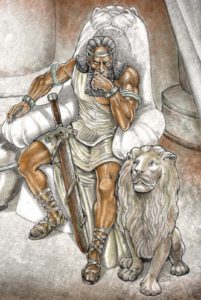behavioral disorder
Gilgamesh ’45’
February 19, 2017In the Assyrian tale of Gilgamesh, over seven thousand years old, the lost and empty king doesn’t listen to the pain in his heart and so mistakenly declares war on Nature, projecting his pain as something to be conquered in the world.
How many times do we project our pain onto the world, rather than face the emptiness in our heart? How many times have we all been given a sign of what might help us find our way only to smash the sign, out of grief, impatience, or anger?
Projecting our pain, grief, impatience, and anger on others, abdicating our gifts to please a loved one, rejecting new learning because it challenges what is familiar, exiling others because they threaten our position or identity, and denying difficulty in hopes that it will go away – – these are all form of not listening that can undermine our aliveness in any given moment.
-Mark Nepo
Washington Post
All would be well, he said, so long as the people made sure always to elect political leaders who were “wise and good.”
By the time we reach ancient Greece, philosophers like Plato start to offer formal definitions of the tyrannical soul, and the picture is one of the person who defrauds freely, takes violently, lies consistently, robs and kills. Think of ’45’ saying last year about terrorism suspects, “You have to take out their families.” Think of his remark, “I could stand in the middle of Fifth Avenue and shoot somebody, and I wouldn’t lose any voters.”
For many years, I’ve taught Plato’s “Gorgias” and “Republic,” where the tyrannical soul is described. Never did I think we would have a walking, talking example from American politics in front of us 24-7. But here we are. I don’t invoke ’45’ when we discuss passages about the tyrant in those texts. But the comparisons are so obvious that after class my students tend to make small, quiet remarks to me about it.
While the institutions of constitutional democracy were invented to make it easier to rein people in, those who did the work of drafting the Constitution never thought that institutions alone could solve the job. On the cusp of the Constitution’s ratification, founder James Wilson paused to ponder what it would take for the reorganized representative democracy to succeed. All would be well, he said, so long as the people made sure always to elect political leaders who were “wise and good.” The president and other elected officials, he pointed out, would populate the bureaucracies of the new nation. If they themselves were wise and good, they would also populate all the offices of the country with the wise and good. If they were not, then corruption would spread through the entire system.
This election has moved past questions of ideology and partisan position to fundamental elements of the human condition, elements so fundamental that we can find them recorded in the earliest human texts. From the beginning of human history, when tyrannical souls have acquired power, the people have found themselves groaning and crying out with laments under the burden of it.
Character matters because it is how we restrain the inner would-be tyrant in each one of us. It matters because it is how we limit the placement of great power in the hands of those with tyrannical instincts and appetites. If we’ve given up a commitment to character, we’ve already given up the game or, to speak more precisely, the work of protecting freedom, equality and human flourishing.
-Danielle Allen/Political Theorist at Harvard University
